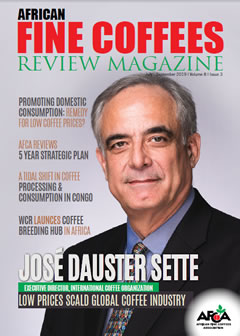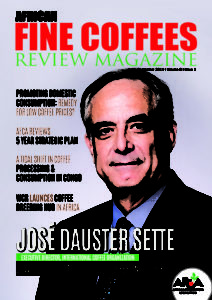The 17th African Fine Coffees Conference and Exhibition (AFCC&E) concluded on a high note in Kigali, Rwanda. With exceptional attendances and world class facilities, the conference continued to gather good reviews, worldwide.
The conference theme, “Specialty Coffees from the Heart of Africa”, highlighted the expected benefits from producing coffees of higher quality. Producing Specialty coffee is one of the means through which African Countries can guarantee improved revenues from produce as consumers on the international market are willing to pay higher prices for higher quality coffee.
In his speech, the Executive Director of ICO, Mr. Jose Sette, noted that the theme of the conference “Specialty coffees from the Heart of Africa” feeds the ongoing debates on unlocking the potential of coffee sector in Africa in order to increase its contribution to a sustainable and inclusive development of the region and meet the objectives of the Sustainable Development Agenda 2030.
De-commoditizing coffee and penetrating into the specialty coffee market is one of the key strategies to increase the value of the African coffee. Specialty coffee, according to Jose Sette is a coffee that has received additional care, whether in selection of the best beans from areas that can produce exceptional quality, or in the way it is brewed and served, in the way it is grown or whether it is associated with complementary flavors to create a variation on a theme. All these factors are involved in the specialty coffee market that is currently booming in many developed markets.
About 1,200 participants from 32 countries are took part in the event, and they include coffee producers, exporters, roasters, policy makers, and buyers from around Africa, the America’s, Europe, among other parts of the world.
Mr. Sette noted that the annual coffee produced in the world is estimated at 162 million bags of 60 kilograms each. Africa accounts for around 12 percent of that global production.
About five million bags of coffee grown in Africa or nearly half of the total produce is specialty coffee mainly from Ethiopia, Kenya and Rwanda.
“As we all know, the history of coffee is one of the price boom and burst in which the former almost invariably ushers in the latter. The current market situation is no exception; coffee prices have been experiencing a downward trend over the last two and a half years”. Sette said.
With the volatility of world coffee prices, another key strategy to achieve a sustainable coffee sector in Africa is the development of domestic and regional consumption of coffee. Expanding domestic consumption is crucial for promoting the inclusive value chain transformation of the coffee industry in Africa, as well as contributing to a global equilibrium between supply and demand. Domestic consumption provides a valuable market outlet, increases producer awareness of consumer demands, strengthens the national private sector and offers vital experience for the eventual export of value-added products.
According to National Agricultural Export Development Board (NAEB), the price of specialty coffee is higher than that of basic coffee. On average, the former is sold at between $4 and $5 against the latter’s $2 or $3 a kilogram.
Rwanda, which produce small quantities of coffee compared to big producers like Brazil and Columbia, can generate more revenues by offering quality coffee. Rwanda exported 23,000 tons of coffee in the financial year 2017/2018, generating $67 million, and it is targeting to generate $75 million through exporting 24,500 tons of coffee in the current fiscal year.
The AFCA Magazine editorial board is pleased to announce that Ambassador George William Kayonga is going to be the cover face of the April – June 2019 Magazine Issue.
Who is Ambassador George William Kayonga?
Amb. George William Kayonga CEO National Agricultural Export Development Board Previously served as Permanent Secretary in the Ministry of East African Affairs, the Rwandan High Commissioner to Kenya and successfully runs a private business. Holds a Master’s degree in International studies and Diplomacy and Bachelor of Commerce-Finance degree.
2. How can you advertise in this April – June 2019 to be released in print (1000 copies) and distributed at the #SCA2019 Event in Boston.
- Click here to download the advertiser’s form.
- Adverts must be received by 25th March 2019.
- Contact; doriane.kaze@africanfinecoffees.org for more information.
Eastern Africa due to its ecology, climate, altitude, and rich coffee genus, is known to produce speciality co ee. Quality coffee starts with the producer whose family has likely spent generations perfecting their approach to farming highest quality coffee. Grown in select altitudes and climates and nursed for years before the first harvest, the producer who creates specialty coffee devotes his or her life to refining and perfecting some of the highest quality coffee on the planet.
In a nutshell, Fairtrade is an alternative approach to conventional trade based on a partnership between producers and traders, businesses and consumers. The international Fairtrade system – made up of Fairtrade International and its member organizations – represents the world’s largest and most recognized fair trade system. Shoppers can recognize products that meet the Fairtrade Standards by the FAIRTRADE Mark. It is through the Mark that we advocate for better working conditions and improved terms of trade for farmers and workers across Africa and the Middle East.
To read more about this please visit click here and visit page 16 – – https://goo.gl/2qbtFd
As profiled in the Nov/Dec Roast 2018 Magazine
Research shows that African-Americans are less likely than other ethnic groups in the United States to select coffee as a beverage of choice. Yet coffee’s history links major contributions not only to Africa but the diaspora around the globe. Ethiopia is praised as the birthplace of coffee, and for giving us some of the most prized coffees in the world. African enslavement was the original source of labor for coffee’s production in Brazil, the Caribbean and the West Indies, and farmers of African descent continue to play a key role in its production. So how is it that African-Americans are only loosely connected to this long-standing historical continuum in coffee, finding themselves underrepresented as consumers as well as professionals in the coffee industry? And how can we as an industry bridge this gap?
To read more about this story click here and turn to page 26 – https://goo.gl/2qbtFd
Meet Amir Hamza, Acting Board Chair, Tanzania Coffee Board & Chairman and CEO of Amir Hamza (T) Limited the owner of the largest Coffee Soluble Plant in East & Central Africa.
We meet up with Amir Hamza at the Mutukula, the Uganda Tanzania Border. We then drive down to Bukoba. Amir shares hilarious stories with us on our 2 hour trip down south. He and his plant manager Ayub tell us about the history of the area, the Idi Amin invasion and local delicacies: roasted grasshoppers included. The entire interview was conducted in their Amimza Board room.
Thank you for having us Bwana Amir.
Questions
- Who is Mr. Amir Hamza?
He is a Tanzanian who loves his country, he loves his home town Bukoba and he loves coffee.
To read more about this article please visit https://goo.gl/2qbtFd and turn to page 8.
Uganda the pearl of Africa. Yes, it is. It is the birth place of the second most traded commodity. I call it the black gold; Robusta Coffee. In a country with a wealth of natural resources; it has a lot more to offer to attract business growth and investment, the Uganda government is committed to developing the private sector e.g. it supports business through the private sector foundation to access opportunities under its matching grant facility. Uganda is among the few countries that benefits from the quota and duty free product access into the US (AGOA), EU (under the EBA and GSP scheme), India (Under the DFT scheme) and China (Under the DFQF scheme), with regulations that permit 100% foreign ownership of companies and it produces more than 15,000 university graduates annually and these are a fraction of the 75% youths that comprise the total of the population. Uganda really is the pearl of Africa.
Uganda is the largest African coffee exporter and the second largest producer. Uganda’s agricultural exports average at 80% of which coffee exports contributes 22% of the total exports accounting the lion’s shares as a foreign currency earner. The Uganda Coffee Value Chain system employs over 1.7 million households and it is estimated that the coffee farmer earns over 70% of the export value of the coffee exported. Currently, the Uganda government through the Ministry of Agriculture Animal Industries and Fisheries (MAAIF) and Uganda Coffee Development Authority (UCDA) is implement the presidential directive to increase the total coffee exports from the current 4.5 million (60Kg) bags expected to reach over 5 million bags in the coffee year 2018/19 to 20 million bags by the year 2025.
To read more please visit – https://goo.gl/2qbtFd and turn to page 40.
CONTACT US
African Fine Coffees Association (AFCA)
Plot 104, Block 5,Kibuga, Nsambya
P.O. Box 27405 Kampala, Uganda









